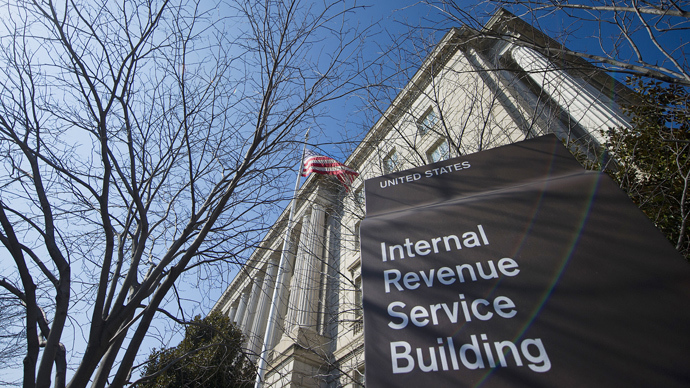'Too little, too late': IRS pays out $53mn to whistleblowers on 2013 tax evaders

The US Internal Revenue Service paid millions to people who turned in their friends and neighbors for tax evasion in 2013, a report states. But there’s an ongoing argument about the nature of award payouts: the current scheme is extremely slow.
The annual report to Congress details a total of 122 awards made to those who exposed tax cheats, according to the AP. That is an average of $435,000 per person, making up $53 million. That total collected by the IRS scheme in 2013 was $367 million.
The award payout figure changes every year, depending on how much fraud has been exposed. In 2012, for instance, it was a sizeable $125 million, but 2011 only saw $8 million paid out to whistle-blowers.
The whistle-blower and informant award scheme explained on the agency’s website states that “The IRS Whistleblower Office pays money to people who blow the whistle on persons who fail to pay the tax that they owe. If the IRS uses information provided by the whistleblower, it can award the whistleblower up to 30 percent of the additional tax, penalty and other amounts it collects.”
But individual payouts in 2012 were actually bigger than in 2013. 128 awards were paid out for the $125 million, compared to half that figure in the fiscal year 2013. This is because the agency has been slow to act on information in a way that would result in a quick payout. It has to first collect the penalty from the evaders – and with complex tax evasion cases the process may take up to seven years.
“The numbers [of tips] coming in are not surprising. The numbers [of payments] coming out are shockingly low,” Stephen Kohn, the executive director for the non-profit National Whistleblowers Center, told The Toledo Blade.
Part of the answer could lie in the report’s claim that an 8.7 percent cut to the awards scheme was made because of overall federal budget cuts; but this difference accounts for barely half a million dollars.
The agency declined to comment further on the report.
Kohn suggested that the IRS should allow individuals to take tax evasion claims directly to court, but business groups fear that this would only create a million cases to sift through. “Anyone with a political ax to grind could use the full force of the IRS” to do away with someone they don’t like, Matt Webb, senior vice president at the US Chamber of Commerce institute for Legal Reform, believes.
‘Slow scheme may cause tips to dry up’
The reality is that the IRS scheme, as it is now, is catastrophically slow, critics say. While 122 awards were paid in 2013, the service received 9,268 whistleblower claims last year. Currently it has more than 11,000 cases, and only three of them are at a stage at which the Whistleblowers Office is even considering paying an award. It can take years to collect awards.
The new IRS report contains recommendations to make it easier for whistleblowers to get paid. Since 2006, the existing initiative took a step forward, mandating payments of 15 to 30 percent from the money collected to anyone who tipped the IRS off to a fraud involving $2 million or more.
The law was proposed by Republican Senator Chuck Grassley of Iowa, a prominent advocate for whistle-blower payout schemes. The senator’s fear is that claims take too long to process, which he feels may discourage whistle-blowing.
"The agency should do everything it can to make these cases a priority," the Senator said. “My worry is that the slow progress will cause the tips to dry up. That would harm the whistle-blowers who stick their necks out to flag tax cheating and the honest taxpayers who pay what they owe and deserve tax fairness."
Grassley is also among a number of people who believe the individual should be able to sue another for tax evasion directly, as is done through another program – the False Claims Act, which allows anyone to sue another person for fraudulent practices. And the Justice Department can sit it out without getting involved at all.
Like Kohn, Grassley sees the False Claims Act as a model for the IRS scheme, with the share of the money claimants received under the Act in 2013 approaching $3 billion – that is eight times the figures given in the IRS report.














